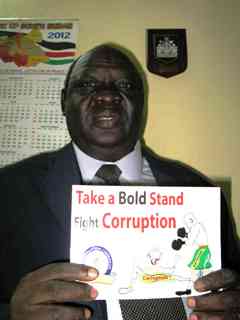S. Sudan’s anti corruption body will “leave no stone unturned” over stolen money
April 14, 2013 (JUBA) – The head of South Sudan’s anti corruption commission, John Gatwech Lul, said Sunday vowed to find the truth behind the disappearance of thousands South Sudanese pounds and dollars from the office of the president.

“We will certainly leave not leave any stone unturned until we get the whole story. All we need now is full cooperation. We need members of the public who may have any information to assist the committee in the process of establishing the truth”, Lul said.
Such incidents, Lul said, were “creating a bad image” of the young nation.
Justice John Gatwich Lul heads the committee, with Awad Masha, Kuyok Abol Kuyok and Ochan Livingstone as the other members.
The committee, according to the presidential order which Sudan Tribune has obtained is tasked with investigating all potential suspects in the office of the president.
The order directs the committee to establish the exact amount of money stolen and explain how such a huge amount of money was stolen, despite presence of heavy security in and around the office of the president.
The are questions over why such large amounts were kept in the building rather than in a bank. The committee will also access the legal measures and steps were taken after the incident and be granted all relevant documents, the presidential order states.
The same order directed the Minister in the office of the President, Emmanuel Lomoro Lowila, to suspend Mayen Wol Jong, Chief Administrator in the office of president, Yel Luol Koor, executive director in the office of the president and Nhomuot Agoth Cithith, the Controller of Accounts.
PUBLIC REACTION
Members of the public in series of interview with Sudan Tribune on Sunday welcomed the president’s decision to suspend the officials and form the investigation committee.
Bol Aguer Yak, an unemployed graduate from Khartoum University’s faculty of law, commended the move but doubted whether the result of the investigation will be implemented even if the suspects are found to have taken the public funds.
“The president has taken right decision to suspend suspects and form investigation committee. What I do not know is whether the results of the committee will be implemented because we have seen similar committee formed before but we didn’t see the result implemented.”
Corruption is rife in South Sudan but no official has ever been prosecuted for graft since the SPLM gained power in 2005 as part of a peace deal with the north, which led to South Sudan’s independence in 2011.
“Such practice gives bad image not only to the president himself as head of the state but the whole country. I know we are a country of thieves.”
In June last year a letter Kiir wrote asking 65 senior officials to return $4bn of stolen funds was leaked to the press. The letter asked that the funds be returned anonymously a bank account in Kenya.
Yak told Sudan Tribune on Sunday:
“People steal money meant for development making it difficult for ordinary people to get services for the last eight years because some people decided to steal in order to enrich themselves with public funds but going to the extent of keeping money is inside the office of the president and steal it is not acceptable. Thorough investigation must be carried and those involved must be held accountable before the court of law.”
Wani Subek, an economic student at Makerere University in Uganda, currently visiting Juba, said honesty in public administration is required in the country so that the public does not lose trust in the government and feel that there are people eating alone while majority of the rural poor are suffering.
“There is really a need to clean up the image of this country. The culture of embezzling public funds is not in our society. South Sudanese in general do not like stealing public resources. So where did this culture of stealing public resources come? The government needs to exert a lot of effort to clean the image of this country in the international community. Corruption is giving us bad name. We are afraid to participate in debates about corruption sometimes at the universities, because some critics comes up with questions which are hurting.”
Majur Mayen, a senior public servant in the government said:
“The issue of corruption should be the public concern. It should not be left to those in the government. It requires collective efforts. The president and his government alone cannot do everything. All the stakeholders are required to contribute in fighting against corruption.”
Machok Lual, a resident of Juba said the government has a challenge to come up with clear policy about how it wants the public to help in the fight against corruption.
“For the government to call public support there must be clear policy. It is true we want an end to corruption in this country. Our people believe in the principle of transparency and accountability. Development will never come no matter how much money we have if corruption is not given utmost attention. We have a government which is controlling. We need a government that imposes proper order in place because where is proper rule of law, things move properly but things do not move properly in a country where a system appears to lack controls.”
(ST)
Salva Kiir orders investigation of his office administrators over stolen money
